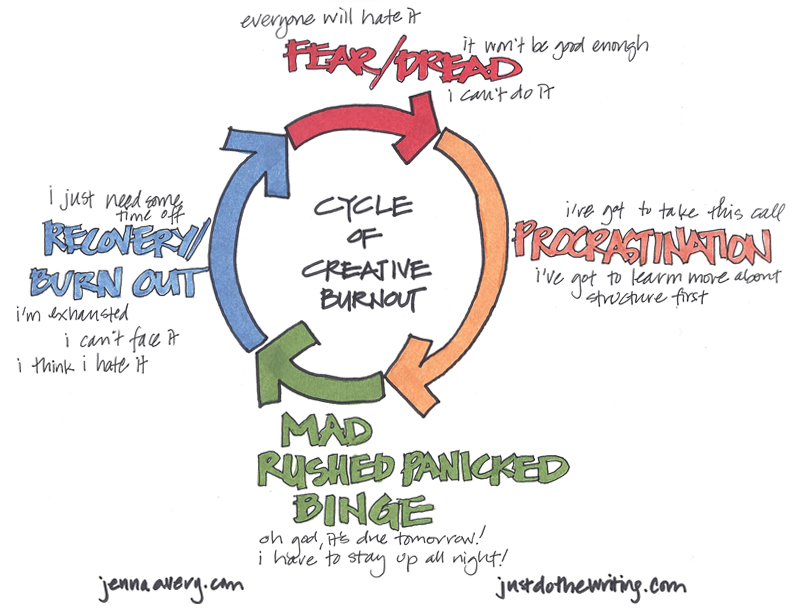
by Jenna | Jan 9, 2013 | Writing Articles
When it comes to making lasting powerful change in your life, the make-it-or-break-it moments come down to the split second decisions you make.
I read something from an organizer who pointed out that so much of clutter we create comes down to making a decision right in the moment to either leave something out or put it away. Since I read that, I've found myself debating internally about my standard practice of "just getting it in the ballpark" when it comes to putting things away and I've started to change it.
Do we care? Are we caring about that?
Why do we care about this?
We care about this because this idea translates to EVERYTHING.
What happens when you're about to say something snarky to your kid or your spouse because you've had a bad day? Do you stop yourself? Do you make a new choice in that split second? Did you know that you can?
What about if you've already said it? Did you know you can make a new choice and apologize?
Or what if you want to be more on time?
I noticed yesterday that the reason I didn't get my son to school on time (there's no official time, but the time I want to be there by) was that I made a series of small choices that led to that outcome. I puttered a little extra. I looked online. I did some work that could have waited until I got back from the gym. Why?
I wanted to be on time. I wanted to get to the gym. But the natural resistance to doing those things was coming up, and I was making split second choices to support the resistance rather than the action.
Today I chose differently.
Today I told myself, "That can wait until I get back."
Today I choose to add things to my to do list on my phone, rather than taking action on them immediately and getting sucked into the work vortex.
Today we drove away from the house exactly on time.
And again I ask, are we caring about that?
We are.
We care about this because it applies to EVERYTHING. Even your creative work, like when you're finding yourself about to "take a break" before you start writing or painting.
Yeah, that.
In that split second you can make a choice not to procrastinate, but to take action instead.
Strengthening Your Willpower Will Change Your Life
Brian Johnson says that willpower is "known by research scientists as the queen of all virtues -- the greatest predictor of health, happiness, wealth and all other good things."
What happens when you start making better split second choices?
You strengthen your willpower.
In turn that strengthens your self-confidence, self-control, and happiness.
And isn't happiness what we're ultimately all looking for?
Surprise! You Can Build Happiness in Small Steps
The beauty of this split second idea is that it doesn't have to be complicated.
- What if I just put this in the drawer instead of setting it down on the counter?
- What if I leave on time today?
- What if I choose not to drink this time?
- What if I just got up right now and went to the gym?
- What if I just sat down and did 15 minutes of writing?
It probably sounds a little crazy, but making these little choices will lead to being happier and more fulfilled. It's about the choice to be in integrity with yourself. And that always feels good.
Accumulate Your Small Choices
The way this gets really fun is when all those little small choices start adding up. I call it "making a critical mass of subtle adjustments."
It's funny how it comes down to the littlest details, like where your creative tools are kept, what time you get up, the small routines you have around your work (or not), etc. It all makes a difference.
An example? Sure!
Here are a couple of my tricks when it comes to writing:
- I use a Mac program called "Isolator" to cover up all the other programs on my screen so I'm not distracted by them (and I turn off all the beeps and pop-ups or hide them so I can't see them).
- I always write with a timer, so I stay focused on my project. I use an online timer or my phone timer so I don't have to hunt around for one.
- I keep a big jug of water in my office, so I can easily refill my water glass if I get thirsty.
- I keep lotion at my desk, so that I don't have to get up if my hands get dry, which can distract me.
- When I'm writing upstairs in bed (which I often do first thing in the mornings), I put the laptop on the charger at my bedside so it's ready to go in the morning. (And I have water and lotion there too!)
These little things make it easy for me to say "Yes" to the writing in those split-second moments that make the difference between doing the work, or not.
Warmly,

You may also be interested in:

by Jenna | Nov 7, 2012 | Writing Articles
In my writing community we periodically talk about creative burnout.
In our Western culture we work hard, driven by puritanical work ethics, cultural programming, keeping up with the Joneses, guilt, etc. It's no wonder we're exhausted.
We push and push ourselves, expecting our wells of creativity, resourcefulness, and inspiration never to run dry.
And then one day, we turn to the well and find it empty. No ideas. Maybe even a sense of dread and apathy.
The only way out is through
In a recent blog post, Mark Sanderson talks about his experience with this kind of creative depletion and how he recovered from it. Interestingly, his solution had to do with carrying on and doing the work no matter what.
He said:
"Some call it 'writer’s block.' I call it sheer terror. When this happens you need to relax and continue to work at your process. I know this too well from experience, but it still proves true every time – the only way to solve specific problems is to sit down and focus on the work."
It seems the only way out is through.
It takes courage
Writing -- for that matter doing anything that calls us to step out of our comfort zone -- requires a great deal of courage. A willingness to be uncomfortable often. To sit in it, do the work, and get to the other side.
No wonder we tend to procrastinate rather than facing that terror and doing it anyway.
Procrastination and burnout are close cousins
I've observed that procrastination plays a key role in creative burnout -- part of a vicious, intertwined cycle:

The reason we work past the point of endurance and exhaust ourselves is that we have procrastinated for so long that we are forced to push ourselves. And the reason we procrastinate that we are afraid.
I love what Steven Pressfield says about fear in his book Turning Pro:
"The professional, by the way, is just as terrified as the amateur. In fact the professional may be more terrified because she is more acutely conscious of herself and her interior universe. The difference lies in the way the professional acts in the face of fear."

by Jenna | Oct 24, 2012 | Writing Articles
I had a lovely chat with a friend recently about applying to a school program she's interested in. She confessed that even though she very much wanted to attend the school, she hadn't yet completed the application.
Ah!
That familiar friend: Procrastination.
Why do we procrastinate about things that are important to us?
Why is that when it comes time to do the hard work, whether it's taking action on our businesses, filing important paperwork, writing that longed for novel or script, or making time for our art, we stall?
I mean, sure, it's hard, but we've also said how important it is to us. We've spent money on classes, books, training, and support. We've written it into our schedules. It's clearly a priority for us, right?
So why so much talk and not so much action?
It's the size of the dream that matters.
I'll say that again: It's the size of the dream that matters.
The more important something is to you, the more fear, procrastination, and resistance you experience. In fact, the level of fear you feel seems to be directly proportional to the size of the dream.
Perhaps even a little bigger, just for good measure.
"The more we care about something, the more we dream, the more fear shows up."
~ Robert Maurer, author of One Small Step Can Change Your Life: The Kaizen Way
The problem: We're wired to shut down in the face of fear.
The fact that our brains are wired to shut down in the face of fear is what creates the entire conundrum in the first place.
As Robert Maurer describes in One Small Step Can Change Your Life: The Kaizen Way, when our brains go into fight-or-flight mode, our frontal cortex -- our thinking, rational brain -- is automatically shut off so that we can respond appropriately and quickly to the threat at hand. This is a natural response to fear. Unfortunately, our mid-brains, home to the amygdala that governs the fight-or-flight response, can't differentiate between the fear that comes up when we're confronted with a tiger or when we're contemplating completing the next great opus.
And so suddenly your thinking, rational and creative brain is completely turned off . . . which when you're attempting to create and design new business ideas or a screenplay, isn't so helpful.
The good news
The good news is that when you can learn to expect the fear to show up, you can normalize it and make it okay. Then it's easier to be compassionate with yourself and coax yourself through the tasks at hand.
I've learned to recognize my own resistance routine and treat it like a familiar visitor I know how to handle.
I tell myself, "It's okay, I know you're scared, you can do this anyway." And I do.
It helps that I make a point to tackle things in small pieces, just the way Maurer recommends: "Small, easily achievable goals -- such as picking up and storing just one paper clip on a chronically messy desk -- let you tiptoe right past the amygdala, keeping it asleep and unable to set off alarm bells."
This is why, even on really tough days, you'll still find me writing at least 15 minutes a day on my screenplay, six days a week, no matter what.
The really good news?
The more work you do in small steps, the more your brain gets rewired with new neural pathways and new habits, making resistance so much easier to overcome.
Warmly,

You may also be interested in:

by Jenna | Apr 4, 2012 | Writing Articles
I waited for a long time before I began writing seriously.
I thought I need to make more money first, get caught up on my other commitments, have more childcare, or somehow find big blocks of time in my busy schedule.
I had a few other “stories” too, like thinking I needed to have a genius idea hit me like a stroke of lightning before I could get started.
With a few nudges from some good friends reinforcing what my soul had been pestering me about for many, many years, I decided the time to start writing was right away, not later.
I took a class to get myself going, which was lovely, but it wasn’t enough to help me make the shift to being a serious writer.
So I did some major life design work to reorganize my business and my life around my writing.
It required some choices that were uncomfortable, like changing my sleeping pattern, developing new disciplines, and making new commitments.
I also started my online writing community.
Getting from point A to point B
From the outside looking in, it can feel overwhelming (especially for sensitive types) to contemplate making a major life change like this, which is why we put it off.
It’s not that hard when you break it down into steps.
- I made the internal decision to write and to think of myself as a writer (I also did some NLP work to ease that transition).
- I implemented the external changes: Adjusting my schedule, my sleeping pattern, my habits, and my commitments to myself and to others.
- I started taking classes and immersing myself in the writing world.
- I shifted my attention in terms of my reading and my community as part of that immersion.
At the outset it felt impossible to get here.
Now there is no question is my mind about being a writer and having writing as an integral part of my life.
Start small, but start now
Barbara Sher says, “Start small and start now.”
The lesson here is that if you have a dream — whether it is to write, dance, sing, act, share your wisdom, start a business, or whatever you feel called to — begin it now.
As W. H. Murray loosely paraphrased from Goethe, “Whatever you can do or dream you can, begin it. Boldness has genius, power and magic in it!”
My writing community has taught me the power of regular, consistent, small action.
In the first session of the writing community, I added 21 pages to my screenplay in 23 days, averaging only 25 minutes of writing per day.
I’m happy to say, that by continuing with that pattern of consistent, regular action (though I did gradually increase the amount of time I put into it), I completed my first feature-length screenplay Monday.
It was truly amazing to see what one can accomplish with small steps.
No matter where you go, there you are
What fascinates me most are the internal shifts we make as we go through a journey like this —ƒ from thinking of ourselves one way (“I’m a coach.”) to a new way (“I’m a writer and a coach.”).
I’ve been through this before, as I made my shift from urban design work to life coaching (apparently I’m one of those serial careerists — check back with me in 10 years and we’ll see where I am!).
I still feel like me, the fundamental essence of who I am hasn’t changed, but the way I think about who I am has changed.
Ah, life!
A tip to go
My favorite trick for getting things into motion is this: Decide what you’re going to work on — something you’ve been dreaming about but putting off — then set a timer for 15 minutes and do it.
Then stop and celebrate.
If you’re feeling really reluctant, set that timer for an even shorter length of time, like 5 minutes. (I’m not kidding about this.)
Then do it again tomorrow.

by Jenna | Feb 15, 2012 | Writing Articles
I’m sharing a free four-part series on “How to Find the Courage to Share the Stories You Are Longing To Tell.”
Our series continues with Part 2: “How to Spot the Stealthy Smokescreens that Stop You From Writing.”
To read yesterday’s post, “Why It Requires Courage to Write,” click here.
 How to spot the stealthy smokescreens that stop you from writing
How to spot the stealthy smokescreens that stop you from writing
If you’re longing to write, but not doing it, you’re probably doing a number of other things instead. I think of these as “smokescreens”, because very often we don’t realize that we are fooling ourselves about why we are not writing — our fear. Our smokescreens mask that raw, naked fear and keep us busy thinking something else is going on.
Most people who say they want to write but aren’t doing it are usually instead:
- Retreating into fantasy.
When you’re retreating into fantasy instead of writing, you’ll notice yourself dreaming about the day when you finally have enough time to write.
You’ll usually have a story about needing to deal with something else first, like: Making more money, getting enough childcare, getting the house clean, finishing that other big project, just getting through this one rough patch in life, etc., but the truth is that there is nothing stopping you from writing right now.
- Procrastinating.
If you’re graduated from fantasy land about writing someday, but still not writing, you’ve probably moved on to procrastination or one of the other tricky smokescreens below.
Procrastination turns up when you’ve made the time to write, but when it comes time to do it, your bathroom suddenly looks really dirty or you realize you are massively behind on [your email, your laundry, your sex life, your book keeping, your fill-in-an-excuse-here].
I’ve seen some writers say that procrastination is a good thing — that we’re allowing our creative ideas to build up before they come bursting out of us — but I read procrastination as fear, often wrapped up with perfectionism.
- Feeling apathetic.
Apathy rears it’s ugly head and tells us that we don’t care. It sounds like, “I mean, what’s the point? I don’t even FEEL like writing today. I’d much rather watch Castle or catch up on polishing my silver. Writing isn’t that important.”
ANNNH. Wrong answer.
What’s really going on here is again, you guessed it, fear. This is fear masquerading as apathy, only it’s so tricky it’s got you believing you aren’t even interested. Think again.
- Wandering in a fog of creative confusion.
Creative confusion is the stealthy partner creative apathy. Creative confusion keeps us spinning in circles, telling us that we don’t know what to write. It keeps you vacillating between having too many ideas and not knowing where to start.
The antidote for creative confusion is often brainstorming, putting ANY words on the page, asking yourself a great question (“What do I really want to say here?”) or simply picking a project to start with. Sometimes we just make it too complicated, again because we’re letting our fear get the better of us.
Takeaways
Here’s what I want you to take away from this: When you are fantasizing about writing, procrastinating about writing, or feeling apathetic or creatively confused about writing, you are operating out of fear. It might not LOOK like far, but the odds are high that it’s fear running the show.
But because you know this now, you have the chance to bust that fear wide open and move past it.
“Ah ha! You can’t fool me,” you will say to your fear and self-doubt. “I see you, and I know you are trying to stop me… but it won’t work.”
Then coax yourself to the page, and start writing. ANYTHING. Seriously. Because the antidote to any of these creative smokescreens is ACTION.

Stay tuned for the next post in this series coming your way tomorrow, “How to Find Your True Stories.” Watch for it on the blog or subscribe here.







